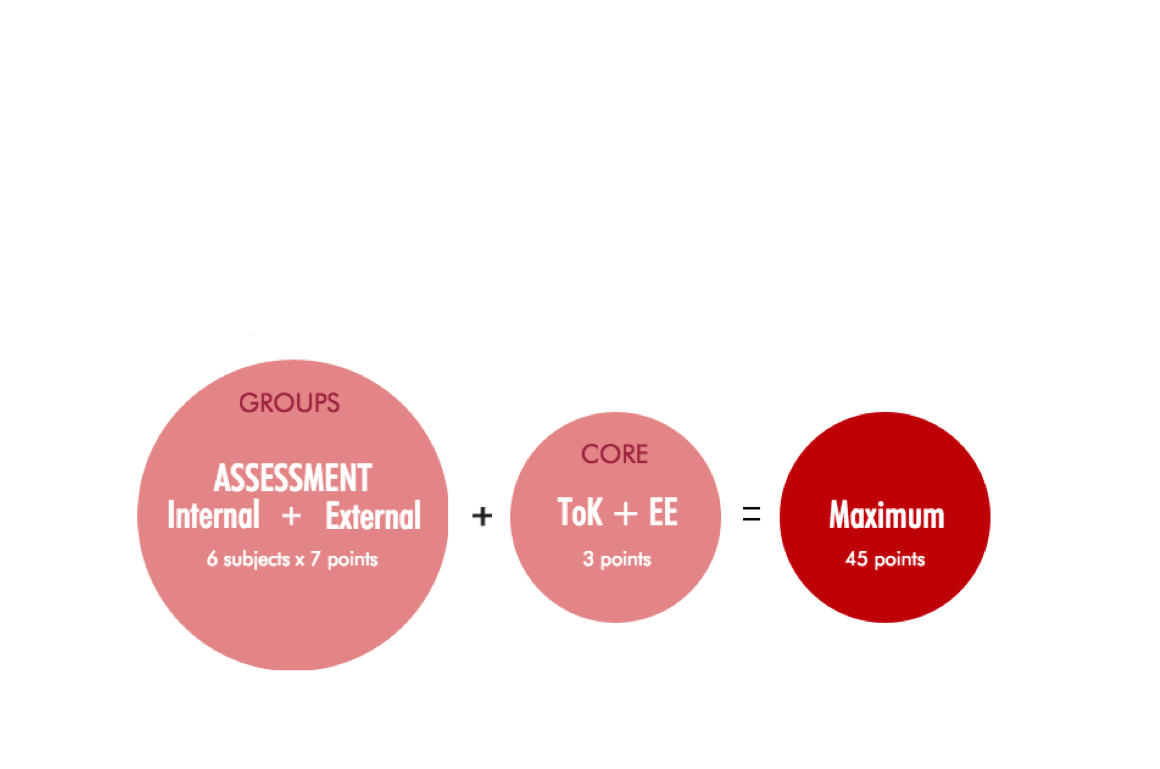1. Methods of assessment
A variety of methods is used to measure student achievement against the objectives for each course. (For more information, see the detailed subject outlines).
1a. External assessment
Examinations form the basis of the assessment for most courses because of their high levels of objectivity and reliability. They include:
- essays
- structured problems
- short-response questions
- data-response questions
- text-response questions
- case-study questions
- multiple-choice questions (limited use of these)
There is also a small number of other externally assessed pieces of work, for example, theory of knowledge essays, extended essays and written assignments. These are completed by students over an extended period of time under teacher supervision instead of examination conditions, and are then marked by external examiners.
1b. Internal assessment
Teacher assessment is also used for most courses. This includes:
- oral work in languages
- laboratory work in the sciences
- investigations in mathematics
- artistic performances
Assessments are moderated by external examiners and normally contribute between 20% and 30% of the total mark.
Some of the arts courses, for example, music, theatre arts and visual arts, have assessment of a major practical component, which can account for as much as 50% of the total mark.
2. Results
There are two examination sessions each year.
- May session—results issued on July 5th (main session for ISA and all schools belonging to the North hemisphere)
- November session—results issued on December 17th (usually the session for retaking subjects)
Following release of results, students` grades can immediately be distributed by the IB to universities and university admission bodies around the world.
Candidates will be able to access their own results via the candidate results website. Candidates can access their results on the following dates:
- May session—results issued on July 6th
- November session—results issued on December 18th
The consistency in Assessment provides confidence to both Parents and University Admissions officials. The official DP results have remained consistent for the last 20 years. Achieving the maximum Diploma points of 45 is very rare with only about 0.31% of candidates achieving this score. The highest subject grade (7 points) is hard to achieve with only about 7% obtaining the top grade in a particular subject.
2015 Exam session:
Average Diploma Points: World (29.88), ISA (35)
Average Grade per Subject: World (4.8), ISA (5.5)
2016 Exam session:
Average Diploma Points: World (30), ISA (36)
Average Grade per Subject: World (4.8), ISA (5.6)
2017 Exam session:
Average Diploma Points: World (29.87), ISA (34)
Average Grade per Subject: World (4.8), ISA (5.3)
2018 Exam session:
Average Diploma Points: World (29.78), ISA (35)
Average Grade per Subject: World (4.8), ISA (5.5)
2019 Exam session:
Average Diploma Points: World (29.78), ISA (34)
Average Grade per Subject: World (4.8), ISA (5.3)
2020 Exam session:
Average Diploma Points: World (31.38), ISA (35.12)
Average Grade per Subject: World (5.08), ISA (5.61)
Passing rate: World (85%), ISA (100%)
2021 Exam session:
Average Diploma Points: World (33), ISA (38)
Average Grade per Subject: World (5.19), ISA (5.81)
Passing rate: World (88%), ISA (100%)
2022 Exam session:
Average Diploma Points: World (30.98), ISA (33)
Average Grade per Subject: World (5.11), ISA (5.18)
Passing rate: World (88%), ISA (96%)
2023 Exam session:
Average Diploma Points: World (30.2), ISA (34)
Average Grade per Subject: World (4.83), ISA (5.32)
Passing rate: World (79.6%), ISA (94%)
2024 Exam session:
Average Diploma Points: World (30.3), ISA (33)
Average Grade per Subject: World (4.9), ISA (5.14)
Passing rate: World (80%), ISA (93%)
3. Grading
Diploma Programme students follow six courses at higher level or standard level. The grades awarded for each course range from 1 (lowest) to 7 (highest) (see DP Grade Descriptors). Performance in theory of knowledge and the extended essay are each graded on a scale of A (maximum) to E (minimum). However, students can also be awarded up to three additional points for their combined results on theory of knowledge and the extended essay (see the DP Programme Matrix). Therefore, the highest total that a Diploma Programme student can be awarded is 45 points. The CAS requirement is not assessed.
The diploma is awarded to students who gain at least 24 points, subject to certain minimum levels of performance across the whole diploma (see below) and to satisfactory participation in creativity, activity and service (CAS).
A bilingual diploma is awarded to candidates who complete and receive a grade 3 or higher in two languages selected from the DP course studies in language and literature.
Students who gain a grade 3 or higher in studies in language and literature and a grade 3 or higher in an individuals and societies or science subject, completed in a different language, will also receive the bilingual diploma.
